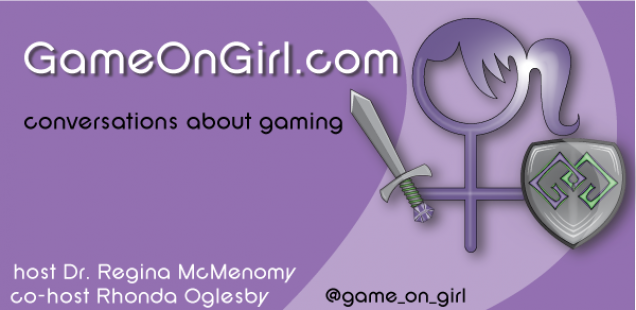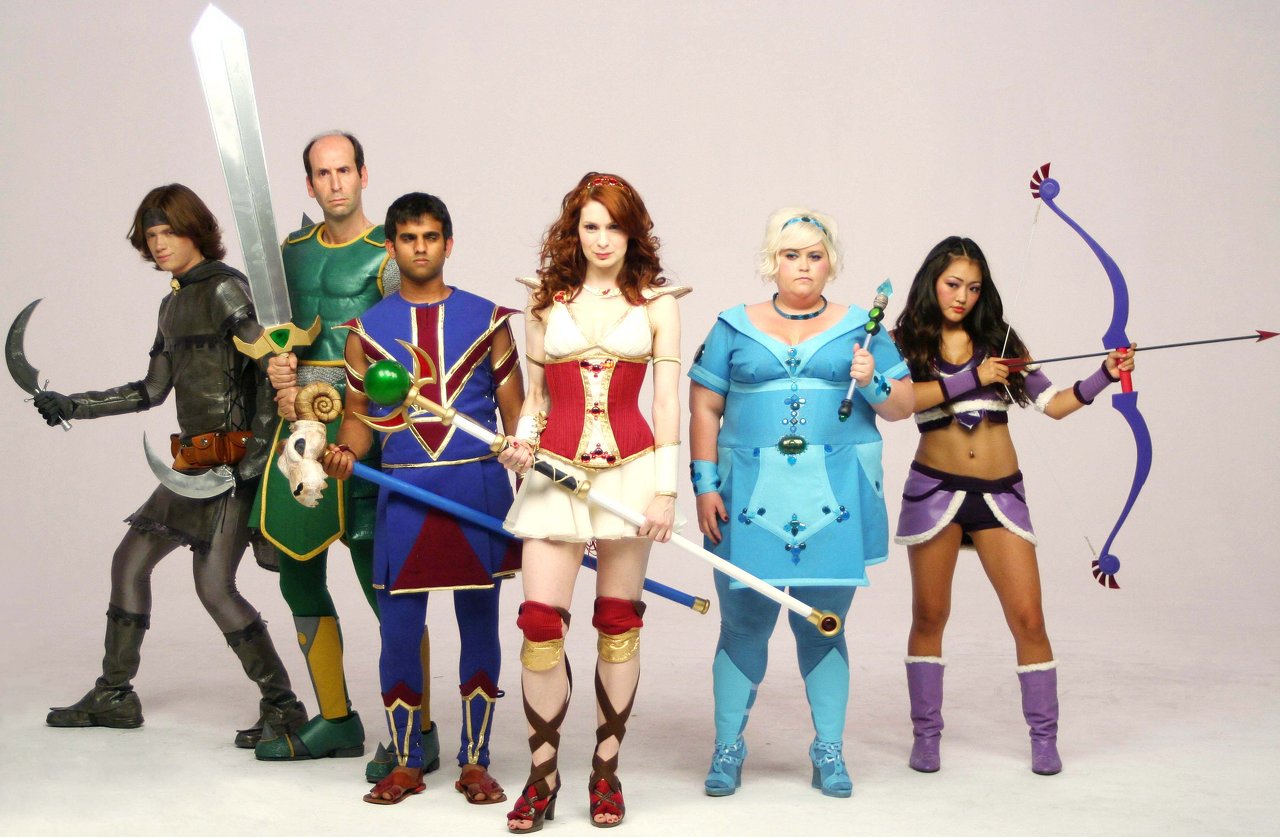
Realms of Representation
Joe Köller talked to Regina McMenomy about academia, feminism and gaming.
Haywire: If you’re interested in the connections of gender and gaming, chances are you’ve already run into the works of Dr. Regina McMenomy, podcastress deluxe. Together with her co-host Rhonda Oglesby she discusses issues of roleplaying, identity and geek culture every week over on Game on Girl. Today she’s joining us for a chat about the project, her research and plans for the future.
Regina McMenomy: Thanks for inviting me.
HW: Anytime. Now, unlike most podcasts out there, you base your discussions not only on a passion for games but also a PhD thesis studying MMOs and their players. Could you introduce us to your research?
RM: For my dissertation research, I conducted interviews with 30 female gamers, mostly MMO players, but the basic requirement was that they had played a game with avatar creation options. I asked them what types of characters they played and what kinds of choices they made when selecting an avatar: hair color, skin color, race, class, etc. I wanted to look at a lot of the general assumptions around women gamers, most of which turned out to be entirely wrong.
One big assumption was that female gamers play healers because they want to take care of the group, but every female healer I talked to said they preferred the role because it took more skill than just doing damage or even tanking. For them healing means staying on top of your game. The only person who said she liked to take care of the group did, in fact, play a tank. This was an idea I hadn’t seen expressed in gaming research before and really challenged the stereotype of the female gamer.
The podcast allows me to continue doing interviews and talking to gamers about what they love about gaming. I developed three gamer types through my data analysis – self, role and mastery players – and we use those types regularly on the show to talk about how people approach or engage in gaming. It’s been a blast to see the types take on a life of their own through the podcast. I wanted a large audience for my research and the podcast has allowed me to reach a lot more people, and a much more diverse audience than a traditional academic publication might have done.
HW: Are you planning to continue your research based on that response?
RM: Essentially, yes. We started the podcast interviews with the questions I used in the dissertation study and have been adapting them since then. We’ve added in a few, including some new thoughts and ideas that came out of the interviews themselves. It’s become a living thing in a way.
HW: Will you be expanding on the theoretical framework and quantitative study of your initial paper then? You certainly have access to more data now.
RM: Well the theoretical framework is expanding. We consider how the gamer types interact with different game mechanics and trends. For example, we’re looking at the idea of permadeath and the gamer types now. It’s an interesting idea and I’ve been curious to see how the different types react to actual loss in game. I’m not sure I would have considered this avenue of research or been able to gather reactions so quickly if I had been writing an academic publication now.
I am talking with an academic publisher about turning the dissertation and the new work from the podcast into a book. I just haven’t had a lot of time to write between my teaching schedule and the podcast. Hoping to take some time to focus on writing over the summer.
HW: I was curious if the podcast had become your sole mode of publication. While it certainly opens up the discussion for a wider audience, I can’t help but wonder how the internet’s tenet of much noise and little signal affects the idea of peer review.
RM: I haven’t really decided what direction I want to take in terms of publication, but I’ve made some strong career decisions that take me away from needing to publish in a peer reviewed format. I don’t want a tenure track professorship. At all. It was the path I thought I would head down when I started my doctoral program but I realized early on that the things I care about aren’t really valued by the tenure process. I’d rather have a mosaic career, where I work on contract, and pursue my own writing and publishing goals. I’m not thrilled about the lack of security, especially since I never know how much money I’ll have coming in semester to semester, but that is a risk I’m willing to take to have the academic freedom I have right now.
 I loved working on my dissertation but there are always compromises you have to make in that process, to please your committee or the grad school. I don’t have to compromise this way and I feel excited about what we’re producing and thrilled to see where it’s going to take me. It’s different and alternative, for sure, but it’s also full of heart and soul, something I find the academy sadly lacks.
I loved working on my dissertation but there are always compromises you have to make in that process, to please your committee or the grad school. I don’t have to compromise this way and I feel excited about what we’re producing and thrilled to see where it’s going to take me. It’s different and alternative, for sure, but it’s also full of heart and soul, something I find the academy sadly lacks.
HW: Working with the internet certainly is different, and the gaming community specifically has a tendency to snap at the kind of gender-related questions you are asking. Any negative experiences in that regard?
RM: Not as of yet. Most of the feedback I’ve gotten on the podcast, both from the general gaming community and my academic one, has been positive. Although the focus for the dissertation was on female gamers, the ideas about identity apply quite easily to both genders. One of the most exciting things for me about the podcast was being able to interview male gamers and see that the same theme emerge from their interviews as well. I’ve never wanted Game on Girl to exclude male gamers, that is one reason why our first live interviews for the show were guys. Gender stereotypes impact all gamers and talking about those issues is an important part of what I want to do with the podcast and my research.
HW: What do you make of the violent backlash to other projects, like Anita Sarkeesian’s Tropes vs. Women idea?
RM: Such an unfortunate display of digital misogyny. I’m sure you’re familiar with Penny Arcade’s Internet Fuck Wad Theory. This seems a prime example of that concept set on fire. I am not quite sure what it is about Sarkeesian’s work that has sparked such a strong reaction. I can’t help but think it’s because she got so much support for it so quickly. I think there can be a lot of resentment toward successful women, especially when they are looking at issues in media that many people would rather ignore, like a topic that will probably reveal a fair amount of sexism in the portrayal of female characters in game.
I admire Sarkeesian. She is totally out there with her feminist viewpoints and stands up to the harassment. It can’t be easy. It’s not even easy to face sexism in smaller doses. A friend recently shared a story with me about how she was congratulated at work with an “atta boy” comment. So completely inappropriate. She works in a male dominated field and knows that if she says something about the inherent sexism in that comment she will be labeled as difficult to work with and it might hurt future promotions. This isn’t anything near the level of sexism that Sarkeesian faces but it is the kind of thing many women face on a daily basis. The internet tends to magnify everything, good and bad, and that is something all of us producing content need to keep in mind.
HW: How should we deal with that fact though? It seems that the people who need your perspective the most are always the least willing to hear it.
RM: There is something to be said for the ovaries to the wall brand of feminism. My approach is a little sneakier, I think. I like to lead by example. It was early in my teaching career when I realized how true the old adage of you can lead a horse to water but you can’t make it drink really is. I can talk to my students for days about how writing is important and how they need to expand their point of view. But that doesn’t have the same kind of impact as posing a question to them and letting them grapple with it and then opening it up to the entire class for discussion.
I often use downloading music illegally in my first year composition classes as a discussion point. Since that course often serves a younger population, most of them have downloaded some (or all) of their music without paying for it. They don’t consider what that means. It’s easy. It’s free. When I stand in front of them and say I pay for every piece of music I own, they first look at me like I’m crazy, but through the discussions they often start to see the issue differently. I try not to preach. I just state how and why it is important to me to acknowledge the work done by those artists. It’s a perspective they haven’t considered. Do they stop illegally downloading music? I doubt it but if it makes them pause and consider what they are doing, I consider that a win.
I like to treat the issues around gender the same way. One of the really important ways to do that I think is to acknowledge that sexism works both ways. Men are subjected to ideal forms of masculinity and that can be very limiting to personal identity as well. Because much of western culture leans towards patriarchy, that form of sexism doesn’t have the same impact it might have on women, but it still exists. That is one way, I think, we might go about approaching those crazy, loud outliers. Acknowledging that they might be facing the same kind of issues in their own lives.
HW: Before we go too far into how to fix society, could you tell us about the growth of Game on Girl? You’ve recently been taking on new contributors and publishing more written content. How much control do you exercise over the site?
RM: One of the main reasons I wanted to start a podcast based on my dissertation research was to continue to engage the community that I started through the interviews. I started the podcast on my own, not really sure where I wanted to go with it, but feeling like it was the start of something big. When I started looking for a co-host I had a few people in mind that had followed the project from the beginning. Rhonda was one of those people. She jumped on board and it’s become one of the best collaborations I’ve ever experienced in my life. We balance each other perfectly.
As the podcast grew, more people were getting in touch with me about their own thoughts about the topics we were covering. In many cases they were people we had already interviewed and had a great time with on the show. So I started thinking about all the many ways I could continue to collaborate with more people on these topics. Recruiting writers for the site seemed the next logical step.
 I put my mind to work and came up with a short list of writers I knew that might be interested in contributing. They’ve all been guests on the show and have long-standing interests in gender and game culture. Most of the time they have complete control over the topics they want to write about, only sometimes we discuss ideas or topics in recent news that we should probably cover. I let them know from the beginning that I don’t want Game on Girl to be a news site. I don’t want summaries or straight news stories. I want it to be a place of reflection for them as writers and gamers and individuals. I’m pleased with the stories that they are producing and the engagement we’re seeing on the site. They’re provocative and engaging people and that shows in their writing.
I put my mind to work and came up with a short list of writers I knew that might be interested in contributing. They’ve all been guests on the show and have long-standing interests in gender and game culture. Most of the time they have complete control over the topics they want to write about, only sometimes we discuss ideas or topics in recent news that we should probably cover. I let them know from the beginning that I don’t want Game on Girl to be a news site. I don’t want summaries or straight news stories. I want it to be a place of reflection for them as writers and gamers and individuals. I’m pleased with the stories that they are producing and the engagement we’re seeing on the site. They’re provocative and engaging people and that shows in their writing.
HW: Do you have a particular direction in mind for the future? Representations of geek culture, gender issues inside and outside of gaming, more general writing?
RM: We’ve already ventured past the main topic I started with – female gamers and identity – and into pop culture and broader web culture analysis. These were both topics that came up quite a bit during the interviews and ran as a secondary theme through the dissertation. A lot of the definitions of “How do you define a gamer?” included engaging in geek and game culture, either online in forums or at cons or other geek gatherings.
This year, Rhonda and I are taking the podcast on the road together. We’re doing our first panel at PAX East in March and we’ll be live podcasting and hosting panels at DragonCon as well. So I guess the next big thing for Game on Girl is to get even more involved in the game community.
As a side note, this will also be the first time Rhonda and I meet in person.. It’s really exciting because we’ve become great friends over the last year and now we get to spend some time gaming, hanging out and promoting the podcast. I am constantly amazed at the way we can connect with and build friendships and community through gaming and similar intersects. It’s so unbelievably powerful.
HW: Let’s say you get one magical email and whoever you ask will agree to be on the podcast. Who do you get?
RM: Can it be a small gathering of people? Okay. I would ask Felicia Day, runner-up being Wil Wheaton. I really admire Day. Her commitment to The Guild and now to Geek and Sundry is part of what inspired me to launch the podcast. Sometimes you have to take your future into your own hands and seeing how successful she’s been with her projects really got me thinking about what I could do myself.
It doesn’t hurt that she’s a gamer, or that The Guild inspired so much of my research, or that she’s a great conversationalist with a huge geeky following. It’s a pipe dream but I’m firmly of the mind it never hurts to dream.
HW: Well, Felicia, if you ever read this, be sure to drop her a line. Thanks for joining us Regina, it was a pleasure.